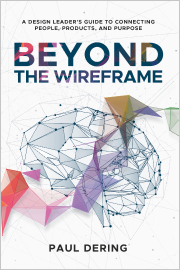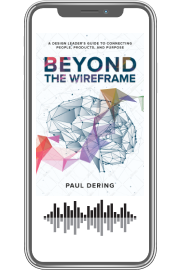Transform Design Teams Through People-First Leadership
Providing practical frameworks and hard-earned lessons from the trenches of design leadership.
For seasoned design leaders and aspiring managers looking to bridge technical expertise with creative vision, build high-performing teams, and create exceptional user experiences that drive business growth.
What You Will Learn From This Book
-
Bridging Technical and Design Thinking
Learn how to leverage your technical background as a competitive advantage in the design world, creating cohesive solutions that integrate diverse perspectives.
-
Creating Psychological Safety in Teams
Discover how to build environments where team members feel secure to take risks, speak up, and contribute fully without fear of negative consequences.
-
Data-Driven Design Advocacy
Understand how to effectively communicate design's value in business terms while maintaining a user-centered perspective, transforming perception and establishing design as a strategic business function.
-
Designing Complex User Experiences
Master techniques for simplifying complex interfaces without sacrificing functionality, creating intuitive experiences that give users confidence in their choices.
-
Cross-Cultural Design Leadership
Master strategies for leading global design teams across different cultural contexts, with techniques for building psychological safety that respects diverse communication styles and collaborative preferences.
-
First 90 Days Framework
Follow a proven three-phase approach for your initial leadership period: observation before action, vision development grounded in organizational realities, and strategic implementation that builds lasting credibility.
-
Design System Governance
Implement the 80/20 governance model that balances standardization with innovation, allowing for global consistency while enabling regional adaptations that meet genuine user needs.
-
Strategic Rapid Prototyping
Discover how to accelerate innovation in enterprise environments using stratified fidelity approaches, modular frameworks, and parallel exploration paths that reduce concept-to-testing time by over 60%.
16 Essential Design Leadership Chapters
How technical expertise becomes a unique leadership advantage, allowing you to bridge development and design with a systems thinking mindset that transforms constraints into catalysts for innovation.
Discover how exceptional design leaders build bridges between user needs and business objectives, transforming competing priorities into complementary forces through strategic translation and alignment.
Master practical strategies for building and retaining high-performing design teams through psychological safety, personalized growth frameworks, and the PETALS measurement system that keeps teams engaged and thriving.
Learn to transform abstract numbers into compelling human narratives that guide design decisions, using a three-tiered approach that connects surface metrics to behavioral patterns and underlying motivations.
Overcome executive skepticism by translating design's value into business metrics that resonate with leadership, using strategic pilots and the Translation Matrix to establish design as a business-critical function.
Transform accessibility from a checklist item to a core design principle that drives innovation, improves usability for everyone, and creates competitive advantage through the Adaptive Interface Framework.
chapter summaries
Create cohesive experiences across diverse contexts with an adaptive design system architecture that balances standardization with regional flexibility, fostering collaboration across international teams.
Master the art of presenting complexity in measured doses, revealing advanced options only when needed to create interfaces that feel both powerful and approachable for users at all levels of expertise.
Accelerate innovation in large organizations by redefining "rapid" for enterprise contexts, using stratified fidelity levels, parallel exploration paths, and modular frameworks that maintain quality while reducing concept-to-testing time.
Build environments where designers take creative risks and contribute their best work by fostering vulnerability, reframing failure as learning, and adapting psychological safety practices across diverse cultural contexts.
Discover how creative pursuits outside the UX field—like music production, podcasting, and videography—provide unique perspectives that transform your design leadership, enhancing collaboration, communication, and innovation.
Master a structured framework for meaningful feedback that transforms design reviews from anxiety-inducing events into catalysts for innovation, balancing psychological safety with rigorous evaluation.
Create unified experiences across different transport modes and systems with journey-centric design approaches that transform fragmented interfaces into cohesive, intuitive experiences supported by integrated technology.
Transform complex, multi-variable decisions into intuitive experiences by inverting the traditional paradigm—allowing users to express preferences directly rather than deciphering pre-packaged options.
Navigate your first three months as a design leader with a strategic framework that balances observation with action, building relationships across departments while delivering early wins that demonstrate value.
Prepare for evolving challenges by developing strategic systems thinking, data fluency, ethical leadership, and collaborative intelligence that will define successful design leadership in an increasingly complex landscape.
Why I Wrote This Book
I believe that connecting people, products, and purpose is the heart of effective design leadership. I have seen how the right leadership approach can transform entire organizations and create outcomes that neither could achieve alone.
What Readers Say

"Paul’s book takes readers on a journey through his career, sharing a variety of stories and learnings along the way. This makes it more than just a list of tactical frameworks; it’s a collection of relatable stories that shed light on the challenges design leaders face. Each chapter concludes with a leadership toolkit, providing actionable insights and tactical approaches to apply immediately. Additionally, Paul includes reflection questions to help readers reflect on their design leadership roles. I found this format incredibly easy to read and a great reference for my leadership journey. Whether you’re a new design leader or a seasoned professional, I highly recommend this book. You’re guaranteed to walk away with valuable insights and actionable steps to improve your design leadership skills."

"Reading Beyond the Wireframe felt like a series of generous conversations with a grounded mentor who knows what it means to lead with intention and clarity. Paul Dering speaks to those working at the intersection of creativity, systems, and human complexity in this book. As a professional who supports neurodivergent individuals, I found deep resonance in Paul's emphasis on psychological safety, purpose-driven leadership, and the structures that make meaningful work possible. This book is the perfect fit for changemakers creating spaces for both leaders and creatives to intentionally thrive."

"What's always made Paul different is how he connects everything: people, ideas, products, and purpose. Paul builds things that last – teams, products, and ideas. This book nails it. It's full of the kind of thinking you wish more leaders had. You'll see why once you dive in."

"Beyond the Wireframe addresses a pervasive problem in the industry; that of different stakeholders becoming entrenched in their opposing views based on their different understandings of what makes a good product. By proposing ways to tackle this divide collaboratively rather than oppositionally, Paul Dering shows a path forward for organizations to build better products that provide more value for both users and the business. By seeing business and technical constraints as design parameters and as a challenge to address, UX teams can create solutions that get buy-in from executives and business leaders. Filled with specific examples from his career, Beyond the Wireframe made it easy to implement these ways of working in my own design practice."
Buying Options
Also available at:
FAQ
What does the book cover?
Beyond The Wireframe covers the essential aspects of design leadership, from building high-performing teams to creating exceptional user experiences. It includes frameworks for psychological safety, effective design critique, and strategies for integrating design with business objectives across global teams.
Do I need a strong technical background?
No, the book is valuable for designers at all levels, regardless of technical background. While it includes insights on bridging technical and design thinking, the principles are applicable to anyone looking to advance their design leadership skills.
Is this book only for design leaders?
Whether you're a seasoned leader looking to increase your strategic impact, a designer taking your first steps into leadership, or someone from another discipline seeking to better understand the value of design leadership, you'll find ideas and tactics you can apply immediately.
How long is the book?
The book is over 230 pages with 16 chapters organized into 5 parts: Foundations, Methods, Scaling, Mindset, and Application. Each chapter includes practical frameworks and real-world case studies.
Is there a digital version?
Yes, Beyond The Wireframe is available as an eBook that can be read on your preferred device and is available from Barnes & Noble and other good book stores.
Is this book available in my country? I don't see my country listed...
Beyond The Wireframe is distributed globally and is very likely available in your country. I have posted links on this page to the main regions that this book will sell to, but if you live elsewhere try searching at your favorite book store for your geographic region. For example, if you live in Germany, check out Amazon.de or if you live in Canada you can find the book at Indigo.ca.
I have a question. How do I contact you?
Send an email to: hello@pauldering.com








